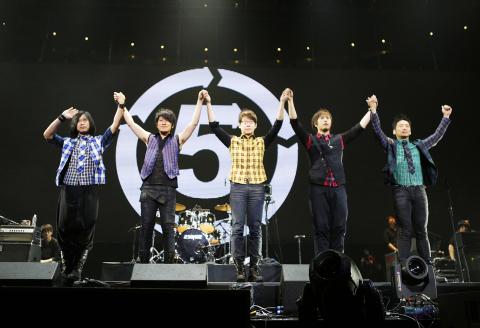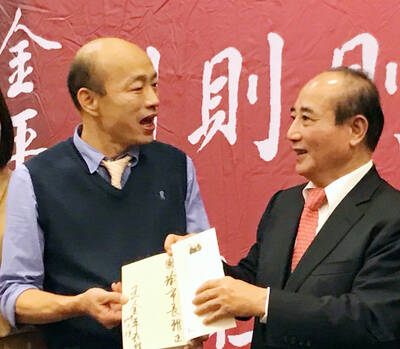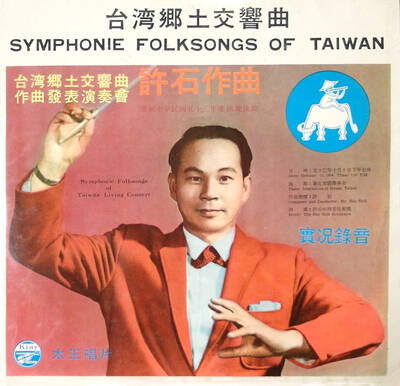Right around the time that President Ma Ying-jeou (馬英九) issued a statement saying he would not meet to discuss the cross-strait service trade agreement with students who have occupied the Legislative Yuan since March 18, Mayday lead vocalist Ashin (阿信) stood on the stage of a packed Madison Square Garden, where his idol John Lennon played 40 years earlier, and began to choke up.
Ashin said he forgot to call his mother back home in Taiwan for her birthday, perhaps because of the difference in time. When Ashin finally reached her, his mother was not in the best of spirits.
“Mom said she wasn’t happy because our home was in the midst of unprecedented uncertainty,” Ashin said, as Stone (石頭), one of the guitarists, held his head and wept.

Photo: Chen Hui-ling, Taipei Times
“I wish someone could tell us what our future holds. I was once able to envision a place where everybody trusted one another, where everybody paid attention to one another, where the strong listened closely to the fears of the weak.
“But these past few days, I can no longer see that place.”
Although Ashin did not mention Taiwan, the trade pact or the occupation of the Legislative Yuan directly by name, for the thousands of Taiwanese fans who came to watch Mayday make history as the first Mandarin band to perform at Madison Square Garden, Ashin was speaking directly to them, their struggle and their country.
Bursts of “Go Taiwan!” (台灣加油) ricocheted through the arena; some fans wrapped themselves in the Republic of China flag. Others lifted their glow-sticks and lighted cellphones. Everyone was listening.
Planned long before students occupied the Legislative Yuan and Executive Yuan this past week to protest the pact — a trade agreement that opponents say will give China unfair competitive advantages in Taiwan’s economy — Mayday’s concert in New York attracted mostly Chinese and Taiwanese fans eager to hear the Taiwanese alternative rock band perform favorites like Racing Car (軋車) and Embrace (擁抱). But the student protests were still on everyone’s mind.
During a press conference after the concert, reporters asked Ashin about his on-stage remarks and whether they were directed at Taiwan. Ashin did not elaborate further, and when one reporter asked a related follow-up question, a Mayday spokeswoman told journalists to confine their questions to the group’s efforts over the last 15 years that have gotten them to where they are today.
In the past, Mayday has lent its name to a number of social causes in Taiwan, including the government’s seizure of land for industrial use in Miaoli County’s Dapu Borough (大埔) in 2010; the construction of a fourth nuclear power plant in 2011; and the death of army corporal Hung Chung-chiu (洪仲丘), who collapsed during a punishment training exercise last year. Unlike the cross-strait trade agreement, none of those issues involved China.
Debate about the band’s position on the trade pact surfaced Friday, when the Taipei Times’ sister newspaper the Liberty Times reported that Ashin angered some Chinese fans after the band’s rousing, anthemic music video Qilai (起來) was posted on Mayday’s Facebook page. Some Taiwanese interpreted this as the band’s endorsement of protests in Taiwan. Soon after, Chinese fans took to Weibo, China’s most popular microblog, and blasted Ashin as an “artist who supports Taiwanese independence,” the article reported. If “Ashin doesn’t like China, he can get the hell out,” wrote a Weibo user, according to the article.
Concert-goers interviewed outside the venue — Chinese and Taiwanese alike — took the news about Ashin and Mayday in stride, saying that he and his fellow band members have the right to express whatever views they wish, even if the audience disagrees.
Daphine Hu (胡丹), from China, said she has many Taiwanese friends in New York and said she would never let politics interfere in her relationships with them.
“I think democracy is fine, and I’m also against these kinds of ‘black-box’ negotiations,” she said, referring to the Mandarin word heixiang (黑箱), used to describe something that lacks transparency. “I just hope people are not misled. Kids are easily manipulated because of an issue. Kids might protest just for the sake of protesting.”
Alina Tseng (曾怡嘉), from Taiwan, said that Ashin’s views and his music “are two separate issues.” Her three girlfriends, who accompanied her to the concert, agreed.
“Ashin was speaking as a Taiwanese and not for Mayday,” Tseng said. “He might have been saying that passing the trade agreement might not be so good for Taiwan’s future. But if a music band wants to make money, of course, China’s market is so big. That’s what the trend is.”
Joe Nong (農炎昭), from China, added that he believed singers have the “freedom” to speak out about their own social and political views. “I personally want to see China and Taiwan united, so if Mayday made its political views more public, I probably would not be very happy,” Nong explained. “From another perspective, Mayday comes to China to make money because that’s where the market is.”
Mayday’s whirlwind tour, which began Feb. 8 and has taken the group across Asia, Europe and North America, will end in California at the Los Angeles Sports Arena on Saturday. Chika Lin (林知佳), a spokeswoman for B’in Music (相信音樂), Mayday’s record label, said in a statement that one goal of Mayday’s Now-Here World Tour was to bring the group, which is celebrating its 15th anniversary, out onto the international stage and introduce westerners to its music.
While Asians made up most of the 14,000 fans attending the concert, there were some western faces in the audience. Ashin told the Taipei Times that this was the first time the band had toured more than 10 venues in Europe and North America, so naturally the audience would still mostly be Asian.
“But gradually, the second time around, you will see more and more western friends,” Ashin said. “And for our next tour, we will also have English-language singles.”
Ashin paused.
“Even the drums will sound like they’re speaking English,” he added.

The depressing numbers continue to pile up, like casualty lists after a lost battle. This week, after the government announced the 19th straight month of population decline, the Ministry of the Interior said that Taiwan is expected to lose 6.67 million workers in two waves of retirement over the next 15 years. According to the Ministry of Labor (MOL), Taiwan has a workforce of 11.6 million (as of July). The over-15 population was 20.244 million last year. EARLY RETIREMENT Early retirement is going to make these waves a tsunami. According to the Directorate General of Budget Accounting and Statistics (DGBAS), the

Many will be surprised to discover that the electoral voting numbers in recent elections do not entirely line up with what the actual voting results show. Swing voters decide elections, but in recent elections, the results offer a different and surprisingly consistent message. And there is one overarching theme: a very democratic preference for balance. SOME CAVEATS Putting a number on the number of swing voters is surprisingly slippery. Because swing voters favor different parties depending on the type of election, it is hard to separate die-hard voters leaning towards one party or the other. Complicating matters is that some voters are

Sept 22 to Sept 28 Hsu Hsih (許石) never forgot the international student gathering he attended in Japan, where participants were asked to sing a folk song from their homeland. When it came to the Taiwanese students, they looked at each other, unable to recall a single tune. Taiwan doesn’t have folk songs, they said. Their classmates were incredulous: “How can that be? How can a place have no folk songs?” The experience deeply embarrassed Hsu, who was studying music. After returning to Taiwan in 1946, he set out to collect the island’s forgotten tunes, from Hoklo (Taiwanese) epics to operatic

Five years ago, on the verge of the first COVID lockdown, I wrote an article asking what seemed to be an extremely niche question: why do some people invert their controls when playing 3D games? A majority of players push down on the controller to make their onscreen character look down, and up to make them look up. But there is a sizable minority who do the opposite, controlling their avatars like a pilot controls a plane, pulling back to go up. For most modern games, this requires going into the settings and reconfiguring the default controls. Why do they